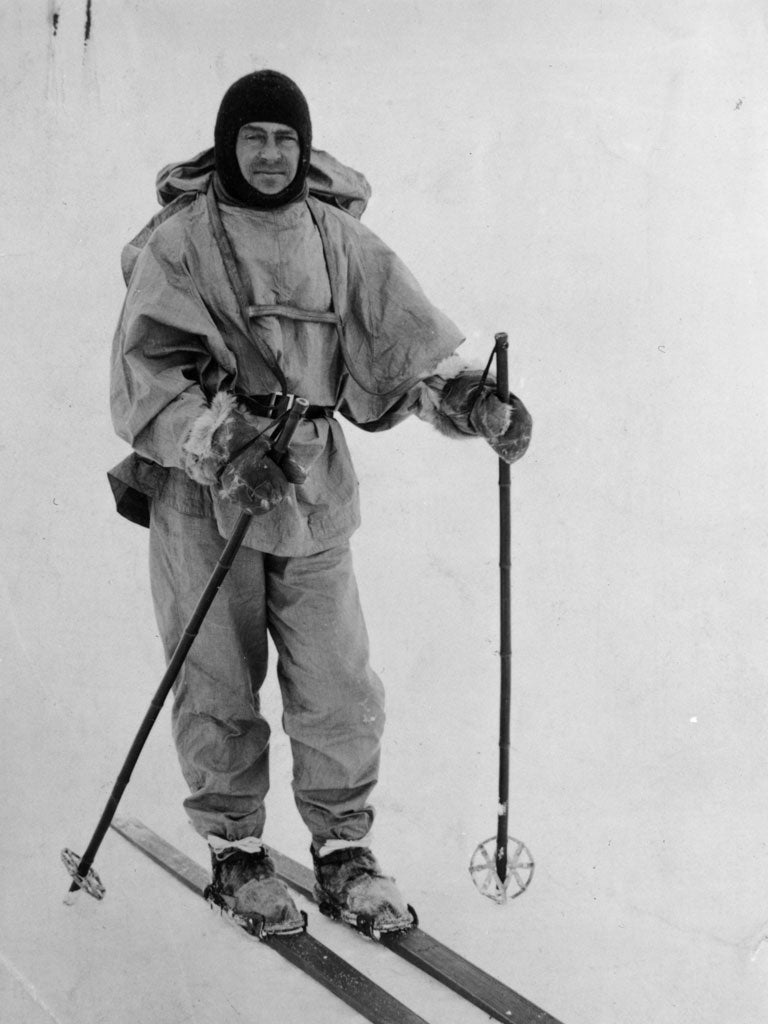Revealed: Wife's last words of comfort to Captain Scott
As the centenary of his death approaches, the letter he held as he died is made public for the first time

The letter is touching: a dispatch from a wife to a husband thousands of miles away, full of gentle reminders to brush his hair and not to smoke too much. But more than that, it overflows with hope that he'll return safely. It was not to be: Captain Robert Falcon Scott clutched the missive to his chest as he lay freezing to death in his tent in the Antarctic, thinking of the wife and son he would never see again.
Now, for the first time, the last letter received by Scott as he embarked on his ill-fated expedition into the Antarctic wilderness is to be made public.
Written by his wife Kathleen 100 years ago, the deeply personal correspondence has been kept within the Scott family since it was found by a search team a century ago on the doomed adventurer's body. Her note and his own final dispatch – which he wrote to his wife when he knew he was dying – together paint a portrait of a loving relationship that lasted only four years.
The 29th of this month marks the centenary of the death of the explorer and his team, who all perished on his second trip – The Terra Nova expedition – to the Antarctic in 1912.
Ironically, the letter reveals his wife's optimism and her belief that he would return in triumph. "When you come home we'll feel closer and closer together and the long time we've been apart will seem only a little hour," she writes. "Now don't forget to brush your hair – and don't smoke so much and altogether you're a ducky darling and hurray for you!"
Other personal effects found on Scott's body and never before seen in public include an initialled case in red morocco leather containing a picture of his wife and young son, Peter. The letters will be brought to life in a new ITV drama-documentary, Words of Captain Scott, to be broadcast on 30 March, with Dougray Scott as Captain Scott.
The explorer's grandson, Falcon Scott, who inherited the letters from his father, Sir Peter Scott, the naturalist, said he decided to release them this year to mark the centenary of his grandfather's death: "Despite revealing the contents, I've kept the actual letter because it's quite personal and I'm just not ready to put it into a museum just yet. I think that my children have the right to make that choice during their lives. But the next best thing is to publicise what we have got and ensure the public do have access to it in some way."
Scott and his men – Edward Wilson, Henry Bowers, Lawrence Oates and Edgar Evans – died from starvation and extreme cold on their way back from the South Pole. Despite reaching the historic marker on 17 January 1912, they found that the Norwegian Roald Amundsen had beaten them to it by five weeks. Such was the disappointment felt by Scott at the defeat that he would later describe the Antarctic in his diaries as "an awful place".
Hailed as a hero by his nation, once news of his death had reached Britain, his status was reappraised and attacked some 50 years later as various historians gathered evidence to suggest that Scott was ill-prepared and made many mistakes on his journey.
Mr Scott admits his grandfather's failure lay in not paying enough attention to his sled dogs: "It was really just the dogs. They weren't as strong as they could have been and that was unfortunate because they were a key support during the expedition."
"You can level lots of criticism against anyone who does anything. People make mistakes. We're human, all of us. They did make some mistakes, but at the same time a lot of the people criticising him haven't actually experienced how hard it is."
Yesterday, a blue plaque was unveiled for Captain Lawrence Oates, who heroically stepped outside his tent after he became unwell, telling his colleagues: "I am just going outside and may be some time."
The 31-year-old walked out of the camp barefoot in a blizzard, never to be seen again. His body was never recovered. The plaque was unveiled in Meanwood Park in Leeds, which his family once owned.
Join our commenting forum
Join thought-provoking conversations, follow other Independent readers and see their replies
0Comments